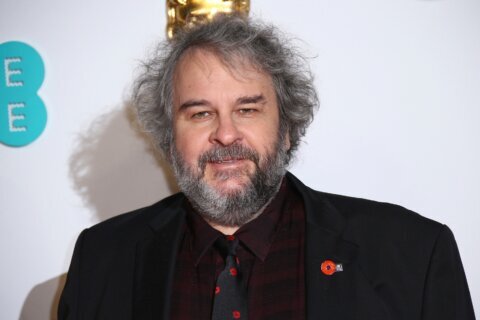WASHINGTON — It’s topped the box office for two weeks and possibly a third this weekend.
So if you still haven’t seen “Crazy Rich Asians,” you’re missing a delightful piece of cultural history that’s proving to be a surprise smash hit like “My Big Fat Greek Wedding” (2002).
That is to say, it’s the first Hollywood film in the 25 years since “The Joy Luck Club” (1993) to feature an all-Asian cast, doing what “Black Panther” (2018) did for the African-American community earlier this year by bringing an underrepresented population to the screen.
But beyond the social significance, it also happens to be a wonderful romantic comedy, keeping the momentum after “The Big Sick” (2017) yanked the genre right out of a coma.
Based on the best-selling 2013 novel by Kevin Kwan, the story follows middle-class New York professor Rachel Chu (Constance Wu) who travels with her boyfriend Nick Young (Henry Golding) to meet his family during a fancy wedding in Singapore. Along the way, she realizes that his family is filthy rich with “old money” from a real-estate empire dating back to Singapore’s founding, meaning she’s under the microscope of attending a celebrity wedding.
Before we dive into the filmmaking, let’s salute the diversity that will hopefully provide the death knell of inaccurate cultural casting. Gone are the days of white actors in “yellow face,” most infamously Mickey Rooney in “Breakfast at Tiffany’s” (1961), but Hollywood still got it wrong as recently as Emma Stone playing a Hawaiian in “Aloha” (2015). It’s an irony each year to see very few Asian nominees outside the Grauman’s Chinese Theatre on Oscar night.
Which is why “Crazy Rich Asians” is so refreshing, casting Malaysia-born Henry Golding and the Virginia-born Constance Wu of Taiwanese-American heritage. Together, they mine a believable romantic chemistry. Golding is undeniably charming, while Wu earns our sympathy for enduring the eye rolls and “gold digger” insults of the various jealous socialites.
Michelle Yeoh (“Crouching Tiger, Hidden Dragon”) is perfectly cast as Nick’s elitist mother, who feels Rachel isn’t good enough for her son. Gemma Chan (“Humans”) has a standout turn as Nick’s lonely cousin Astrid, who hides her jewelry so as to not make her husband feel inferior, only to find out that he’s cheating on her. Still, it’s rapper Awkwafina who steals the show as the comic relief, following up on her role in “Oceans 8” (2018) for a stellar year.
Her scenes best showcase the screenwriting chops of Peter Chiarelli (“The Proposal”) and Adele Lim (“Private Practice”). While the plot relies on tried-and-true genre archetypes, it’s all executed seamlessly with subversive dialogue. We’ve often heard Americans say, “Eat! There are starving people in China,” including the “fah rah rah” flick “A Christmas Story” (1983). This script flips it as Ken Jeong (“The Hangover”) says, “Eat! There are starving children in America!”
It’s the first laugh-out-loud line of an Act One that takes its sweet old time introducing us to the various characters and setup of the premise. Folks with short attention spans might find the opening sluggish, but the pace really picks up in Act Two as we land in Singapore. From there, it’s off to the races as we’re swept up in the whirlwind of the cultural surroundings.
Director Jon M. Chu (“Now You See Me 2”) visually dazzles with lavish interiors and colorful landscapes, namely the Gardens by the Bay where urban towers look like sprouting trees. He also uses splashy visual effects to superimpose texts and tweets, showing how fast gossip travels with the double-edged sword of social media. On the one hand, bullying is rampant. On the other, word can spread to increase turnout in elections — or in this case — movies.
Seeing as a sequel is already in the works, we surely haven’t seen the last of Chu, who will also direct the upcoming film version of Lin-Manuel Miranda’s Broadway musical “In the Heights.” It will be a chance for him to helm a different diverse cast of Hispanic-Americans.
It’s easy to see why Chu is trusted to direct a musical; some of the strongest moments in “Crazy Rich Asians” feature perfect soundtrack selections. You’ll tear up with a lump in your throat during Kina Grannis’ acoustic cover of Elvis Presley’s “Can’t Help Falling in Love” during a touching walk down the aisle. Later, you’ll smile at Katherine Ho’s Chinese cover of Coldplay’s “Yellow,” a cleverly symbolic finale for a film burying the practice of “yellow face.”
It’s impossible to overstate what it means for people of an underrepresented population to finally see themselves on screen. It’s inspiring and validating. For the rest of us, it’s an important cultural exchange that proves why Roger Ebert once called cinema the ultimate “empathy machine.” By going to the movies, audiences live vicariously through the folks on screen, fulfilling Atticus’ dream to “climb inside someone else’s skin and walk around in it.”
And yet, none of this would matter if the movie itself lacked in quality. Not so. This one soars start to finish with a universal theme. It reminds us that in a materialistic world filled with fifty shades of glitz, glamour and “unreality” shows, the happiest couples are those who ignore fame, fortune and family expectations to realize that finding a soul mate is truly priceless.









